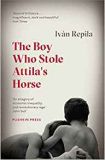The Boy Who Stole Attila's Horse by Ivan Repila and Sophie Hughes (translator)
| The Boy Who Stole Attila's Horse by Ivan Repila and Sophie Hughes (translator) | |
|
| |
| Category: Literary Fiction | |
| Reviewer: John Lloyd | |
| Summary: A startling and most memorable allegory, given due care and attention by a wonderfully presented pocket book form. | |
| Buy? Yes | Borrow? Yes |
| Pages: 112 | Date: March 2015 |
| Publisher: Pushkin Press | |
| ISBN: 9781782271017 | |
|
| |
If you pick up a copy of this book you realise how small it is. You'll know, of course, that pockets hardly exist that are normally big enough to hold what we used to call a pocket book, but here is the exception to prove the rule. It's wee. The story is on a hundred pages. The concision is partly down to it starting after the beginning, for we first meet Big and Small, two brothers, once they're stuck down a large well in the middle of a forest. Tasked with a family errand, they're trapped at the bottom of a natural Erlenmeyer flask, and even a desperate move cannot get either out. This is the story of the next three months in their existence, as they brave hunger, delirium, loss of language, and the brute and unstinting human selfishness needed for existence.
This is one of those weird, fantastical situations, grounded in a heartily real psychology, that can be read as straight literature – it is a fascinating circumstance, in and of itself. But we can guess it and its author have an ulterior motive, and if we couldn't guess that then two political quotes on the forepages remove all doubt. This is an allegory of the human condition – the impracticality of the levelling up that the socialists seek, the level playing field that would make all survive on an equal footing. Not for nothing are the brothers – one assumes one is mid-teens, the other on the cusp of pubescence in my mind – called Big and Small. Such simple words are heavily loaded in this situation.
The whole plays out like a fully metaphysical 127 Hours, with the nightmarish settlement of two people trapped unnaturally in nature. Just like that there's a sterling sense of dread, an engagement with the non-physical world (when they play I Spy… one is told to pick none of those abstract words. Only things that can be seen), and even though this is fiction, a there-but-for-the-grace-of-God feel. Yet the book does want us to think that we are there, that in some instance we are either Big or Small. One of them envisages humanity in cages, and in what he says the book breaks away from its timeless, geography-less aspects, and becomes grounded in some kind of modern human world.
In the end I think I sought less of that that removed me from the other-worldly existence down the well, or perhaps more of the clear fable. The book fit too well on its own fence, taking a middle ground, being too overt here yet too unclear as to its meaning there. But it certainly held a basic tenet, a simple 'what if?' idea and a rich literary content, for every second of its reading, and that basic circumstance will leave me with memories, both big and small, for many a long time.
I must thank the publishers for my review copy.
By trial or error, this publisher is sewing the market for Basque-originating political allegory right up - we enjoyed their all-ages volume, The Adventures of Shola by Bernardo Atxaga.
Please share on: ![]() Facebook,
Facebook, ![]() Twitter and
Twitter and
![]() Instagram
Instagram
![]() You can read more book reviews or buy The Boy Who Stole Attila's Horse by Ivan Repila and Sophie Hughes (translator) at Amazon.co.uk Amazon currently charges £2.99 for standard delivery for orders under £20, over which delivery is free.
You can read more book reviews or buy The Boy Who Stole Attila's Horse by Ivan Repila and Sophie Hughes (translator) at Amazon.co.uk Amazon currently charges £2.99 for standard delivery for orders under £20, over which delivery is free.
![]() You can read more book reviews or buy The Boy Who Stole Attila's Horse by Ivan Repila and Sophie Hughes (translator) at Amazon.com.
You can read more book reviews or buy The Boy Who Stole Attila's Horse by Ivan Repila and Sophie Hughes (translator) at Amazon.com.
Comments
Like to comment on this review?
Just send us an email and we'll put the best up on the site.


